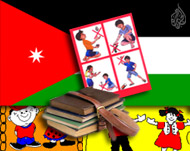Scepticism over curricula review
A controversy is building up in Jordan and some other Arab countries over plans to introduce “human rights and peace culture” into school curricula.

Critics say they are not against the development of school textbooks “in principle”, but are sceptical over the connotations and timing of the blueprint, particularly as it comes on the heels of certain remarks by US President George Bush.
Bush and senior American officials made it clear they wanted certain elements removed from textbooks. These include Islamic teachings cited by fighters as incentives for committing “acts of terrorism”, including the 11 September, 2001 attacks in the US.
The opposition Islamic Action Front (IAF), Jordan’s largest political party, considers the simultaneous declaration by pro-US governments in Jordan, Saudi Arabia and Kuwait to amend curricula as bowing to American pressure. The front is leading a campaign to derail the move through legal means.
“We look to this decision as a type of succumbing to American demands. Arab countries have started to change their textbooks in order to make them acceptable to the US administration,” IAF Secretary-General Hamza Mansur said.
Outside influence
“We reject any curricula amendment that does not emanate from a national will and independent planning,” he added.
Mansur’s concerns were echoed by leaders of other opposition parties, trade unions and even pro-government members of parliament.
At the behest of more than 50 deputies, the lower house of parliament held a special session last month during which Education Minister Khalid Tuqan defended the plan, contending that it “had nothing to do with any American pressures”.
“The plan does not run counter to the rules of Islamic sharia (law), values of the Arab culture, the constitution or the education philosophy and guidelines as adopted by the landmark education conference held in 1987,” he said.
“The education ministry and UNESCO have come up with a document in which a set of concepts is listed as guidelines for textbook designers. They focus on the rights to live in peace, travel and elect, as well as on self-determination, equality of expression and religious freedom,” he added.
Government probe
The House voted to refer the proposed changes to the parliamentary committee on education, which is still probing the plan before reporting back to the chamber, according to its chairman Adnan Hassouneh.
 |
|
Education ministers in Jordan |
“As a matter of principle, we are not against development of the education process, because we consider it as one of the norms of life, provided that it does not affect the nation’s fundamentals,” Hassouneh, an IAF lawmaker, said.
“The minister assured us Jordan is not coming under any outside pressures to adopt the document and that the curricula development plan dates back to 1999,” he added.
Despite the assurances, Hassouneh said that he still casts doubt on the motives for adopting the scheme at this time by several Arab states.
“I believe this synchronisation is not a matter of pure chance and that certain sides stand behind it. We have reservations over the portions pertaining to peace and the culture of peace,” he said.
Unique position
“These proposals will be subjected to a deep probe and will not pass without due scrutiny. The panel is coming up with recommendations to the House that the plan be amended so as to fit our reality and unique position as a targeted nation,” he added.
Jordanian Islamic scholars confided that they believed the textbooks relating to Arabic and Islamic culture would be targeted with a view to “removing Quranic verses and Prophet Mohammad’s sayings that urge jihad and martyrdom, which Western nations consider as the driving force for alleged acts of terrorism”.
But former Education Minister Thawqan Hindawi ruled out the possibility of education officials and planners in Jordan and other Arab states being trapped into adopting any curricula that undermine well-established Arab and Islamic values.
“Out of personal conviction, I am inclined to believe that no official or education planner is going to sanction curricula changes that contradict our fundamentals as an Arab nationalist and Islamic country,” Hindawi told Aljazeera.net.
“Even in Saudi Arabia, where people are keen on preserving Islamic teachings and heritage, it will be difficult for the authorities to market such changes, because what is at stake then will be the establishment itself,” he said.
Petition
Hindawi’s concerns found expression in a petition submitted to the Saudi authorities by about 150 prominent scholars in the Saudi kingdom, who urged the government to conduct a deeper study of the proposed revision of school textbooks to ensure they do not touch on the country’s unique legacy as the cradle of the Islamic creed.
Hindawi pointed out that he was well aware of eyebrows being raised over the timing of the proposed introduction of changes into textbooks simultaneously in several Arab countries.
“Regardless of this, I believe the development of curricula is a sustainable process that should be carried out according to a pre-set educational philosophy rather than in a discretional manner,” he said.
|
“This document is not free from unacceptable foreign intervention. It tries to inject poison into honey” Hani Dahleh, |
Arab human rights activists also saw US fingerprints in the planned school curricula changes certain Arab governments intended to put into effect as of the beginning of the next scholastic year in September.
“I believe this document is not free from unacceptable foreign intervention, because it tries to inject poison into honey,” chairman of the Amman-based Arab Human Rights Organisation (AHRO) Hani Dahleh said.
“We are not against the inclusion of human rights culture in school textbooks, but we are against capitulation to foreign pressures.
“We do think the target is the Arabic-Islamic culture, which they want to see turned into a legacy without any colour or taste,” he added.